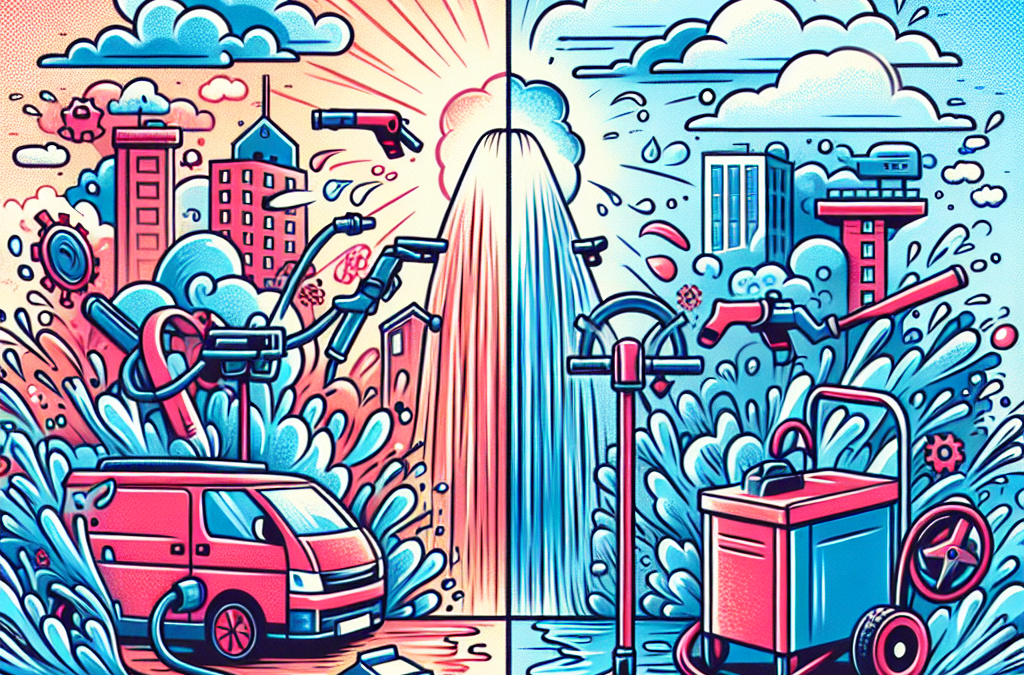Is Soft Washing Better Than Pressure Washing?
When it comes to cleaning surfaces such as roofs, siding, and decks, you have likely heard of both soft washing and pressure washing. But which method is truly the best option for your property? While pressure washing has been a popular choice for many years, soft washing offers several advantages that make it a better alternative. In this article, we will explore the benefits of soft washing over pressure washing and why it is the preferred method for cleaning various surfaces.
Table of Contents
- The Difference Between Softwashing and Pressure Washing
- The Benefits of Softwashing
- Softwashing vs. Pressure Washing: Which is Better?
- FAQs
- Conclusion
The Difference Between Soft Washing and Pressure Washing
Before we dive into the benefits of soft washing, let’s first understand the difference between soft washing and pressure washing. Both methods involve using water to clean surfaces, but they differ in terms of pressure and cleaning agents used.
Pressure washing utilizes highly pressurized water to remove dirt, grime, mold, and other debris from surfaces. It is commonly used for heavy-duty cleaning tasks such as stripping paint or removing stubborn stains. While effective, pressure washing can be too harsh for certain materials, leading to damage or surface erosion.
Softwashing, on the other hand, involves using low-pressure water combined with specialized cleaning solutions to gently remove dirt, mold, mildew, and algae from surfaces. The cleaning solutions used in softwashing are eco-friendly and biodegradable, making them safe for plants, pets, and the environment. This method is particularly suitable for delicate surfaces like roofs, siding, and decks.
The Benefits of Softwashing
Now that we understand the difference between soft washing and pressure washing, let’s explore the benefits of soft washing:
Gentle Yet Effective Cleaning
Softwashing provides a gentle yet effective cleaning process. The low-pressure water and specialized cleaning solutions work together to penetrate deep into the surface, eliminating dirt, mold, mildew, and algae at their source. This thorough cleaning ensures a longer-lasting result compared to traditional pressure washing methods.
Additionally, softwashing can clean areas that are difficult to reach, such as roof shingles and crevices in siding. The combination of low-pressure water and cleaning solutions allows for a comprehensive clean without causing any damage.
Preserves Surface Integrity
One of the key advantages of softwashing is its ability to preserve the integrity of various surfaces. High-pressure water from pressure washing can cause damage to delicate materials like wood, stucco, and vinyl siding. Soft washing eliminates this risk by using a gentler approach that doesn’t compromise the structural integrity of the surface being cleaned.
By avoiding high-pressure water, soft washing reduces the likelihood of cracked paint, chipped surfaces, or water intrusion. This preservation of surface integrity ensures the longevity of your property and prevents the need for costly repairs or replacements.
Environmentally Friendly
Softwashing is an environmentally friendly cleaning method. The cleaning solutions used in soft washing are biodegradable and safe for plants, animals, and water sources. Unlike pressure washing, which may involve the use of harsh chemicals, soft washing minimizes the impact on the environment while still delivering exceptional cleaning results.
By choosing soft washing over pressure washing, you can contribute to a greener and more sustainable approach to property maintenance.
Softwashing vs. Pressure Washing: Which is Better?
While pressure washing has its merits in certain applications, the soft wash method is generally considered the better option for most surfaces. Here’s a comparison between the two methods:
| Aspect | Soft washing | Pressure Washing |
|---|---|---|
| Effectiveness | Gentle yet effective at removing dirt, mold, mildew, and algae | Highly effective for heavy-duty cleaning tasks |
| Surface Integrity | Preserves the integrity of delicate materials | Risk of damage to surfaces if not used carefully |
| Eco-Friendliness | Uses biodegradable cleaning solutions | May involve the use of harsh chemicals |
| Accessibility | Cleans hard-to-reach areas without causing damage | Can reach high-pressure areas but may cause damage |
Based on the above comparison, soft washing emerges as the preferred method for most cleaning tasks. Its gentle yet effective cleaning process, preservation of surface integrity, and eco-friendly approach make it a better choice for maintaining the cleanliness and longevity of your property.
FAQs
Q: Can softwashing remove tough stains?
A: Soft washing is designed to remove dirt, mold, mildew, and algae. While it may be effective for some stains, stubborn or deep-set stains may require additional treatment or a different cleaning method.
Q: Is softwashing safe for plants and pets?
A: Yes, softwashing is safe for plants and pets. The cleaning solutions used in soft washing are biodegradable and pose no harm to living organisms when used as directed.
Q: How often should I have my property softwashed?
A: The frequency of softwashing depends on various factors such as the location of your property, surrounding vegetation, and weather conditions. It is recommended to have your property softwashed annually or as needed to maintain its cleanliness and appearance.
Conclusion
Softwashing offers numerous benefits over traditional pressure washing methods. Its gentle yet effective cleaning process, preservation of surface integrity, and environmentally friendly approach make it the preferred option for cleaning various surfaces. Whether you need to clean your roof, siding, or deck, consider softwashing as a safe and efficient solution that will leave your property looking refreshed and well-maintained.

Recent Comments